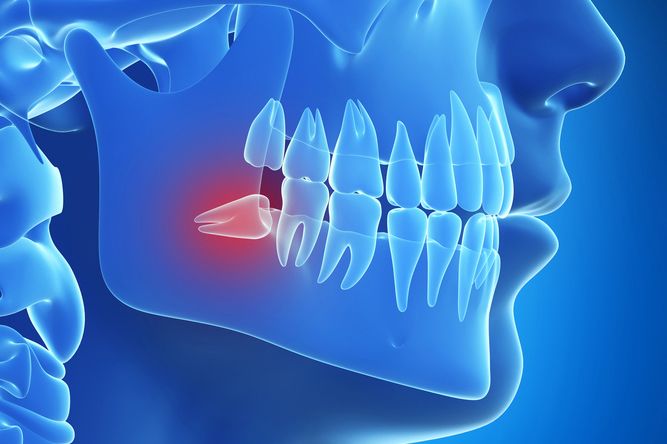Impacted Wisdom Teeth: Why Extraction Is Necessary
 Wisdom teeth are an additional set of molars that emerge as a person is reaching adulthood. Typically, the first signs of wisdom teeth appear around the late teens, with the wisdom teeth fully emerging by the early twenties. We can monitor the emergence of wisdom teeth at our Orland Park dental office to ensure they are not impacted.
Wisdom teeth are an additional set of molars that emerge as a person is reaching adulthood. Typically, the first signs of wisdom teeth appear around the late teens, with the wisdom teeth fully emerging by the early twenties. We can monitor the emergence of wisdom teeth at our Orland Park dental office to ensure they are not impacted.
When a patient has impacted wisdom teeth, a dentist will recommend wisdom tooth removal. Let’s cover the basics of this issue so you understand what the treatment involves.
What Are Impacted Wisdom Teeth?
Impacted wisdom teeth refer to wisdom teeth that do not come in straight. These wisdom teeth come in at angles or twisted, which may put pressure on the adjacent second molars or the jawbone. This can be quite painful and lead to a number of different health problems if they are not addressed.
Dangers of Tooth Damage and Infections
When impacted wisdom teeth press up against other teeth, the pressure on the second molars can lead to toothaches, cracks, and weakened tooth structure. These weakened teeth are more susceptible to tooth fractures that could lead to root canal infections. If the impacted wisdom teeth were not present, this danger would not be an issue.
Wisdom Teeth Can Cause Oral Hygiene Difficulties
In addition to harming existing teeth, impacted wisdom teeth could lead to difficulties with your normal oral hygiene routine. The wisdom teeth could block your ability to brush and floss around your second molars, increasing your risk of tooth decay and gum disease.
Do Wisdom Teeth Need to Be Removed?
While some people may be able to keep their wisdom teeth if they grow in straight, it’s a good, common sense idea to remove wisdom teeth that are impacted. By removing impacted wisdom teeth, patients can prevent various health problems that we touched on above.
Monitoring Your Wisdom Teeth
When it comes to wisdom tooth extraction, timing is important. During a patient’s teens, dentists will monitor the emergence and progress of the wisdom teeth. With a dental exam every six months, dentists can determine an ideal time to remove the wisdom teeth and how to prevent problems should they arise.
How Wisdom Tooth Extraction Is Performed
Wisdom tooth extraction is performed with a patient under general anesthesia, with local anesthetic used to prevent pain and discomfort. An oral surgeon carefully removes some of the gum tissue from around the wisdom teeth and pulls them out with their root. The gap is sutured shut so patients can fully recover.
What to Expect After Wisdom Tooth Extraction
In the first days after wisdom tooth extraction, patients may experience some discomfort around the back of the mouth where the wisdom teeth were located. The soreness can be managed using prescription pain relievers and over-the-counter medication as directed.
Patients will want to have a liquid/soft food diet for the first day or so to avoid chewing. Avoiding foods that are hot or cold in temperature is ideal to prevent tooth sensitivity. Be sure to follow all rinsing/cleaning instructions carefully to keep the mouth sanitary.
Contact Premier Dental & Implant Center
To learn more about extracting wisdom teeth and other issues related to oral surgery, be sure to contact an experienced cosmetic and restorative dentist. Our team is here to answer your questions and help you smile with renewed confidence.


